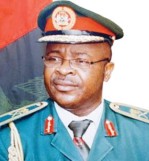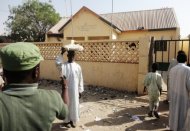A spokesman for the Boko Haram Islamist group on Saturday rejected a call by Nigeria's president for talks and threatened fresh attacks if captured members of its group were not freed.
Goodluck Jonathan's call for talks was "not sincere", said Boko Haram spokesman Abul Qaqa, and if captured members of the group were not released, the group would launch attacks like those in Kano.
A series of coordinated bomb attacks and shootings there on January 20 killed at least 185 people.
This latest threat from Boko Haram came hours after the army said troops had killed 11 members of the Islamist group in a shootout Saturday in the northeastern city of Maiduguri, a stronghold of the group.
Lieutenant Colonel Hassan Mohammed, spokesman for Joint Task Force (JTF), a special squad set up to crack down on Boko Haram, broke the news of the clash earlier Saturday.
"Today, in an exchange of fire during a cordon-and-search operation conducted by the JTF, 11 Boko Haram members were killed," he said.
Qaqa confirmed the killings, but disputed the army's account.
"It is true soldiers killed 11 of our members today in Maiduguri," Qaqa said in a conference call with journalists in Maiduguri.
"They were individually picked in their homes in Shehuri neighbourhood in raids by JTF and shot dead. They were unarmed," he added.
Qaqa dismissed as "not sincere" comments by the president in a media interview this week in which he urged Boko Haram to state its demands and begin dialogue.
"They are making double-speak," he said.
"The same day Goodluck Jonathan came out and said we should come out for dialogue security agents in (the northern state of) Sokoto arrested a large number of our members in raids on their homes."
If the group's members were not released, he continued, Boko Haram "will launch attacks in Sokoto similar to the big Kano attacks."
Saturday's clash came as part of a crackdown on the group, which already this year has been blamed for more than 200 deaths in a string of bombings and shootings that has tipped Nigeria into a security crisis.
Maiduguri, the capital of Borno state, has been hit hard by the Boko Haram insurgency, and on December 31 President Goodluck Jonathan placed the city under a state of emergency.
The Islamists have in recent days struck further west, notably in the devastating attack on Nigeria's second city of Kano.
Security forces in Africa's most populous nation and top oil producer have struggled to contain the threat from the group. The insurgents seem to be able to strike at will in a country divided between a mainly Muslim north and mainly Christian south.
The president has faced intense criticism for his failure to stem the violence.
In a recording posted recently on the Internet, the purported head of Boko Haram, Abubakar Muhammad Shekau, said he had ordered the Kano attacks, the sect's deadliest ever, because the army was torturing the group's members.
"I ordered it and I will give that order again and again," he said in the recording.
The assault on Kano involved coordinated gun raids and suicide blasts in Nigeria's second city and highlighted Boko Haram's renewed strength.
But as the group grows increasingly violent, its specific aims and character remain largely unclear.
It has previously said that it wants to create an Islamic state in Nigeria's deeply impoverished mainly Muslim north, and has charged the government with harassing Muslims and raiding Islamic schools.
The group was also blamed for coordinated attacks on Christmas Day, the most deadly at a Catholic Church near the capital Abuja, where at least 44 people were killed. But the group's victims have also included scores of Muslims.
Top Nigerian politicians have denied that the Boko Haram insurgency is being fuelled by religious tensions, linking the group to like-minded external Islamist groups such as Al-Qaeda.
Many analysts however doubt the strength of those links and say Boko Haram remains focused on a domestic agenda and is boosting its strength by exploiting religious tension within Nigeria.
The group launched an uprising in 2009 that was put down by a brutal military assault.
It fell dormant for about a year before re-emerging in 2010 and now believed to have a number of different factions, including a hardcore Islamist cell.
NEWS






